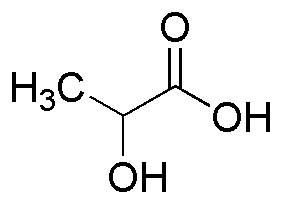2-Hydroxypropionic acid is widely utilized in research focused on:
- Food Industry: As a natural preservative and acidulant, it enhances flavor and extends shelf life in various food products.
- Cosmetics: Commonly used in skincare formulations, it acts as a humectant, helping to retain moisture and improve skin texture.
- Pharmaceuticals: Serves as an intermediate in the synthesis of various drugs, contributing to the development of effective therapeutic agents.
- Biodegradable Plastics: Plays a crucial role in producing eco-friendly polymers, promoting sustainability in packaging materials.
- Research Applications: Used in biochemical assays and as a reagent in organic synthesis, aiding researchers in developing new compounds and studying metabolic pathways.
General Information
Properties
Safety and Regulations
Applications
2-Hydroxypropionic acid is widely utilized in research focused on:
- Food Industry: As a natural preservative and acidulant, it enhances flavor and extends shelf life in various food products.
- Cosmetics: Commonly used in skincare formulations, it acts as a humectant, helping to retain moisture and improve skin texture.
- Pharmaceuticals: Serves as an intermediate in the synthesis of various drugs, contributing to the development of effective therapeutic agents.
- Biodegradable Plastics: Plays a crucial role in producing eco-friendly polymers, promoting sustainability in packaging materials.
- Research Applications: Used in biochemical assays and as a reagent in organic synthesis, aiding researchers in developing new compounds and studying metabolic pathways.
Documents
Safety Data Sheets (SDS)
The SDS provides comprehensive safety information on handling, storage, and disposal of the product.
Product Specification (PS)
The PS provides a comprehensive breakdown of the product’s properties, including chemical composition, physical state, purity, and storage requirements. It also details acceptable quality ranges and the product's intended applications.
Certificates of Analysis (COA)
Search for Certificates of Analysis (COA) by entering the products Lot Number. Lot and Batch Numbers can be found on a product’s label following the words ‘Lot’ or ‘Batch’.
Numéro de catalogue
Numéro de lot/série
Certificates Of Origin (COO)
This COO confirms the country where the product was manufactured, and also details the materials and components used in it and whether it is derived from natural, synthetic, or other specific sources. This certificate may be required for customs, trade, and regulatory compliance.
Numéro de catalogue
Numéro de lot/série
Safety Data Sheets (SDS)
The SDS provides comprehensive safety information on handling, storage, and disposal of the product.
DownloadProduct Specification (PS)
The PS provides a comprehensive breakdown of the product’s properties, including chemical composition, physical state, purity, and storage requirements. It also details acceptable quality ranges and the product's intended applications.
DownloadCertificates of Analysis (COA)
Search for Certificates of Analysis (COA) by entering the products Lot Number. Lot and Batch Numbers can be found on a product’s label following the words ‘Lot’ or ‘Batch’.
Numéro de catalogue
Numéro de lot/série
Certificates Of Origin (COO)
This COO confirms the country where the product was manufactured, and also details the materials and components used in it and whether it is derived from natural, synthetic, or other specific sources. This certificate may be required for customs, trade, and regulatory compliance.


